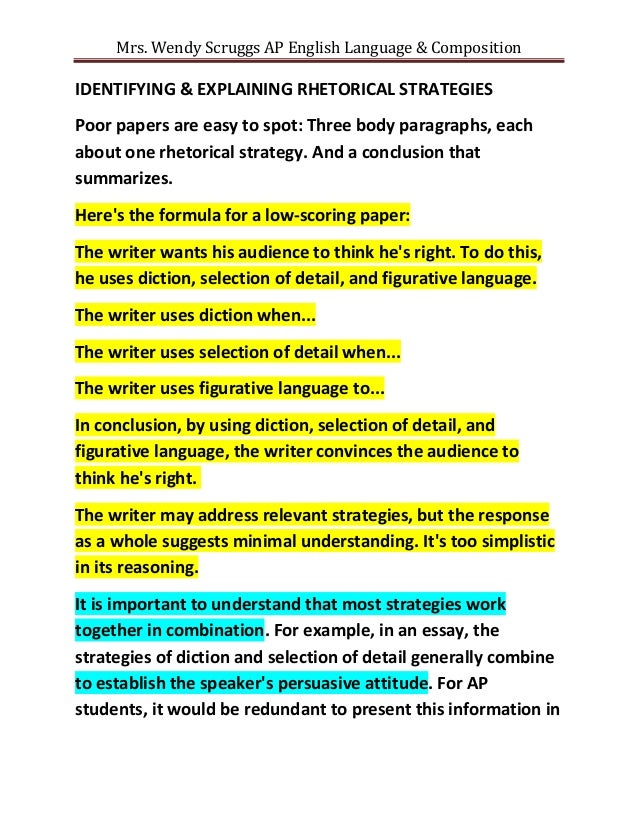
If your writer fails to follow your initial requirements, and you are not satisfied Rhetorical Question In Argumentative Essay with your custom research paper, you Rhetorical Question In Argumentative Essay can ask for a free revision. Your Rhetorical Question In Argumentative Essay writer will make all the necessary changes to ensure that you · Asking a rhetorical question in your thesis statement is an absolute no-no because thesis statements are meant to answer a question, not pose another question. Through the thesis statement, you need to highlight the main argument of your essay and using this space to insert a rhetorical question is certainly a waste of space as it fails to give a clear indication of what your paper is about Rhetorical questions are questions that are not intended to be answered (and that the writer doesn't proceed to try to answer). They pose a question with a seemingly obvious answer in order to use that implied answer as a step in their argument
Rhetorical Questions in Essays: 5 Things you should Know | Helpful Professor
Rhetorical questions can be useful in writing. In this article I outline 5 key reasons that explain the problem with rhetorical questions in essays. Despite the value of rhetorical questions for engaging audiences, they mean rhetorical question in argumentative essay in your university papers.
Teachers tend to hate them. There are endless debates among students as to why or why not to use rhetorical questions. Many, many teachers hate rhetorical questions.
A rhetorical question is a question whose purpose is to add creative flair to your writing. It is a way of adding style to your essay. Rhetorical questions usually rhetorical question in argumentative essay have obvious answers, no answers, or does not require an answer. Here are some examples:. I understand why people like to use rhetorical questions in introductions.
You probably enjoy writing, rhetorical question in argumentative essay. You probably find rhetorical questions engaging, and you want to draw your marker in, engage them and wow them with your knowledge. Rhetorical questions are awesome … for blogs, diaries and creative writing.
They engage the audience and ask them to predict answers. But, sorry, they suck for essays. Academic writing is not supposed to be creative writing. Rhetorical questions are designed to create a sense of suspense and flair. They therefore belong as a rhetorical device within creative writing genres.
Academic writing should never, ever leave the reader in suspense. Therefore, rhetorical questions have no place in academic writing.
Academic writing should be in third person — and rhetorical questions are not quite third person. The rhetorical question appears as if you are talking directly to the reader. It is almost like writing in first person — an obvious fatal error in the academic writing genre.
Your marker will be reading your work looking for answersnot questions, rhetorical question in argumentative essay. They will be rushed, have many papers to mark, and a lot of work to do. They want answers. Therefore, rhetorical question in argumentative essay, academic writing needs to be straight to the point, never leave your reader unsure or uncertain, and always signposting key ideas in advance. Rhetorical questions are by definition passive : they ask of your reader to do the thinking, reflecting, and questioning for you.
Imagine if the five points for this blog post were:. Instead, they demand something of your reader. Questions — rhetorical or otherwise — position you as passive, unsure of yourself, and skirting around the point. So, avoid them. Rhetorical questions have a tendency to be written by students who are struggling to come to terms with an essay question. The interviewer asks you a really tough question and you need a moment to think up an answer.
You pause briefly and mull over the question. You say it out loud to yourself again, and again, and again. You do this for every question you ask.
You end up answering every question they ask you with that same question, and then a brief pause. As a literary device, the rhetorical question is pretty difficult to execute well. In other words, only the best can get away with it. The vast majority of the time, the rhetorical question falls on deaf ears, rhetorical question in argumentative essay. Teachers scoff, roll their eyes and sigh just a little every time an essay begins with a rhetorical question. Let your knowledge of the content win you marks, not your creative flair.
The fact is that there are enough teachers out there who hate rhetorical questions in essays that using them is a very risky move. Whether I or you like it or not, rhetorical questions will more than likely lose you marks in your paper. Such rhetorical question in argumentative essay weight of scientific consensus places the 3 percent of scientists who dissent outside of the scientific mainstream.
They rhetorical question in argumentative essay risky, appear out of place, and despised by a good proportion of current university teachers. Skip to content Rhetorical questions can be useful in writing.
Contents show. Rhetorical Question Examples. Rhetorical Questions can come across as Passive. Rhetorical Questions are seen as Padding. Rhetorical Questions are hard to get right. Teachers Hate Rhetorical Questions in Essays. Some possible Exceptions. Summing Up.
English Lesson - Rhetorical Questions
, time: 19:07argumentation - Rhetorical questions in argument - Philosophy Stack Exchange

Rhetorical questions are questions that are not intended to be answered (and that the writer doesn't proceed to try to answer). They pose a question with a seemingly obvious answer in order to use that implied answer as a step in their argument If your writer fails to follow your initial requirements, and you are not satisfied Rhetorical Question In Argumentative Essay with your custom research paper, you Rhetorical Question In Argumentative Essay can ask for a free revision. Your Rhetorical Question In Argumentative Essay writer will make all the necessary changes to ensure that you · Asking a rhetorical question in your thesis statement is an absolute no-no because thesis statements are meant to answer a question, not pose another question. Through the thesis statement, you need to highlight the main argument of your essay and using this space to insert a rhetorical question is certainly a waste of space as it fails to give a clear indication of what your paper is about
No comments:
Post a Comment